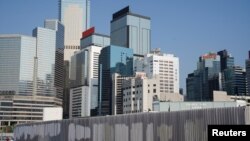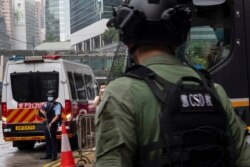Implementation of last year’s highly contentious national security law could cost Hong Kong its international luster as a financial hub, experts have told VOA.
More than 130 residents, activists, politicians, journalists and others have been arrested under the law despite the government’s initial promise the law would not affect ordinary citizens.
Discussions revolving around how it might affect the city’s valued financial sector have become more heated.
Hong Kong Monetary Authority chief executive Eddie Yu, whose agency’s responsibilities include maintaining Hong Kong’s status as an international financial center, sought to reaffirm the city’s financial stability in a February blog post, saying concerns are often “misinformation or disinformation,” reassuring investors that the level of capital flowing into the city has not been declining, and the number of asset managers is still growing.
Yue refused to offer updated comments related to more recent arrests under the law when approached by VOA.
This year, Hong Kong’s stock exchange recorded the third-highest level of IPO proceeds, following the New York Stock Exchange and Nasdaq, with some experts predicting a continuing momentum in coming months.
Asset freeze rattles international investors
However, global risk firm Verisk Maplecroft’s principal geopolitics analyst Hugo Brennan stressed that the pro-democracy newspaper Apple Daily’s forced shuttering and frozen assets “have rattled investors.”
“Companies and investors based in Hong Kong that fail to toe Beijing’s political line face the greatest exposure to asset seizures,” Brennan told VOA.
With the founder Jimmy Lai in prison and a few executives arrested under the national security law, the newspaper’s financial assets had been frozen before any conviction. It is widely considered to have been a government move to silence opposition voices and a crackdown on press freedom.
Hong Kong’s score on Maplecroft’s Freedom of Opinion and Expression Index over the past three years has worsened from the 112th worst-performing globally in 2018 to now 73rd, Brennan said.
A law expert warned of the potential risks to company assets under the law that “can be highly unpredictable and changing like wind.”
“The national security law is capable of breaking a company. Assets can be frozen under some causes vaguely defined by the law, so investors will certainly have to be mindful of this risk,” Horace Yeung, associate professor at the University of Leicester law school, told VOA.
This concern has been shared by close to half of the expats based in Hong Kong, according to a May survey by the American Chamber of Commerce in Hong Kong. The report showed that there have been “growing underlying tensions and nagging fears,” mostly stemming from “discomfort due to the national security law.”
Losing its place even as a gateway to China’s vast market?
While AmCham spokesperson Tara Joseph told the BBC earlier this year that capital flow between Hong Kong and the mainland China “is very hard to replicate,” Brennan predicted that the portion of Chinese investment into Hong Kong compared to international capital flowing into Hong Kong “is likely to increase over the coming decade.”
“International investors are increasingly wary of being caught in the crossfire in Hong Kong, as Beijing tightens its grip via the national security law and Western states counter with international sanctions,” Brennan said.
Alfred Wu, associate professor at the National University of Singapore specializing in Chinese politics, said companies are now forced to choose between moving their offices to mainland China, which would shift more of their business toward China, or shifting their offices overseas. He also said companies might choose to move their offices to mainland China because Hong Kong’s advantage derived from rule of law is now fading.
Earlier this year, major commercial bank HSBC announced plans to start an office in China’s Greater Bay Area – China’s effort to link Hong Kong, Macao, Guangzhou and several other cities as a unified business hub – after the Asia chief signed a petition in support of the national security law in June last year.
“These implications can be boiled down to the fact that Hong Kong’s financial status has been jeopardized. In the future, the city will likely become China’s financial center, instead of an international hub,” said Wu.
Brennan added that the city’s rule of law was Hong Kong’s traditional competitive edge over its rivals, but the recent erosion will “likely induce some international companies to move their regional hubs to alternative commercial centers, such as Shanghai or Singapore.”
China’s support of Hong Kong’s capital flow between Hong Kong and China might keep the city afloat as a domestic financial hub, “as a means to increase its control over the territory,” said Brennan.
Yueng said that both domestic and international corporations will “reconsider their options of HQ locations so as to control their exposure to political and legal risks.”
“Hong Kong has always played and capitalized on its role as the middleman between the East and West. If it becomes ‘One Country One System’ in Hong Kong, I do not think Hong Kong will continue to be appealing to international corporations.
“They can choose any major cities in China, notably Beijing, Shanghai, Guangzhou, and Shenzhen, to be their regional HQs, especially if China is their target market.”
Hong Kong might still have a role to play as a financial gateway to China, if there are still restrictions on movement of capital in the mainland, Yueng added.
Wu added that Hong Kong can still be an appealing location for money laundering from mainland China’s wealthy families and corrupted officials, despite losing its international luster.
“But now Hong Kong is very much a part of China in terms of jurisdiction. If China steps up its anti-corruption campaign, it can affect Hong Kong, so money and talents might also switch to Singapore,” Wu said.
Editor's note: A previous version of this story incorrectly spelled the name of Horace Yeung, associate professor at the University of Leicester law school. We apologize for the error.






